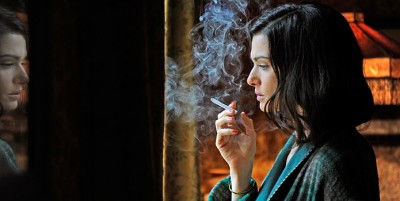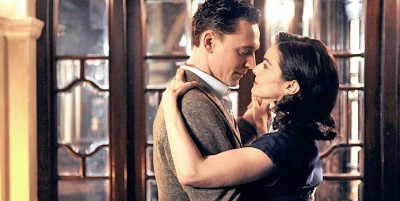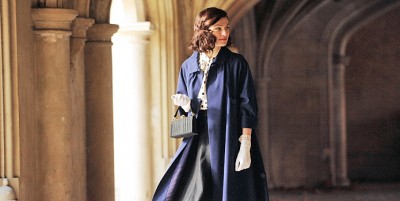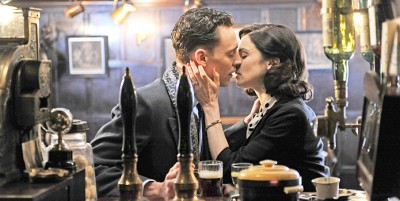| Reviews & Columns |
|
Reviews DVD TV on DVD Blu-ray 4K UHD International DVDs In Theaters Reviews by Studio Video Games Features Collector Series DVDs Easter Egg Database Interviews DVD Talk Radio Feature Articles Columns Anime Talk DVD Savant Horror DVDs The M.O.D. Squad Art House HD Talk Silent DVD
|
DVD Talk Forum |
|
|
| Resources |
|
DVD Price Search Customer Service #'s RCE Info Links |
|
Columns
|
|
|
Deep Blue Sea, The

Please Note: The images used here are provided by Music Box Films and are not taken from the Blu-ray edition under review.
The British director Terence Davies is best known for his more or less directly autobiographical works -- an early trilogy of remarkable short films as well as the two masterpieces that have cemented his place among the greats, 1988's Distant Voices, Still Lives and 1992's The Long Day Closes, in addition to his wonderful, personal documentary/essay on his hometown of Liverpool, 2008's Of Time and the City. There's another half, though, to his unfortunately unprolific body of work, one in which he's set his hand to adapting literary/stage sources to the screen: 1995's The Neon Bible (after John Kennedy Toole's novel), 2000's excellent Edith Wharton adaptation, The House of Mirth, and how his latest glorious foray, The Deep Blue Sea, a cinematization of a 1952 play by Terrence Rattigan (The Browning Version, The Winslow Boy). But this seemingly less personal part of his oeuvre doesn't require much closer inspection before revealing itself to be just as personal, even autobiographical, and just as much a treat for the cinephile as Davies's films of his original scripts. Adapted or wholly invented, he filters everything from the page through his rarefied sensibility, some sublimely idiosyncratic vision in his mind's eye where the nostalgically recollected radio/family-sing-along songs and movie musicals of his working-class Catholic upbringing in postwar Liverpool meet a highly selective, rigorous, classical taste in music, painting, and literature (his favorite work of art is said to be T.S. Eliot's Four Quartets, but he worships Meet Me in St. Louis with near-equal fervor), and The Deep Blue Sea, I'm happy to report, is no exception.
Rattigan's play tells the story of Hester Collyer (Rachel Weisz), an eminently respectable upper-middle-class lady living in rationed, drab postwar England (somewhere, not far away, They Made Me a Fugitive's story is concurrently being played out), the daughter of a vicar and the wife of a judge (Simon Russel Beale, My Week with Marilyn) who has thrown away her deathly, stifled life of secure privilege to carry on an adulterous affair with footloose, fancy-free former RAF pilot Freddie Page (Tom Hiddleston, Midnight in Paris's F. Scott Fitzgerald) in a cheap bedsit flat in a lower-rent part of London that's still rather crumbled and struggling from the war. Davies has apparently taken some liberties with Rattigan's structuring, eliminating much cinematically unnecessary, expositional dialogue and reordering events to pull into his own shape what have to be described as the tableaux of Hester's desperate, despondent, doomed affair with Freddie. He does this in much the same way he structures the narratively loosely connected scenes in the films he's based on his own childhood experiences from around the same early-'50s period: in what appears to be a free-associative manner, but actually in a duration and order adhering closely to a precise, almost musical emotional logic of causes, effects, and continuities.

We begin on a voiceover on the credits, taken from the note Hester has written on what sounds to be the occasion of her very last in a series of suicide attempts arising from her emotionally masochistic relationship with the well-meaning Freddie, who only has a certain depth of feeling he can access and offer to Hester, while her feelings for him, as she confesses to her husband honestly and forthrightly, go all the way to her core, to her very will to keep living. Beginning with the depiction of the action the note attempts to explain, each subsequent scene, past or present, then builds on and advances Hester's tumultuous, often humiliating journey from dead marriage to dying affair -- emotional/psychological stations of the cross, courtesy of an auteur who's easily in the running alongside Scorsese and Bresson for most Catholic filmmaker ever, however lapsed -- toward not the martyrdom we fear but an unexpected, bracing, bittersweet sort of liberation from both her kindly, asexual, mother-beholden husband and the revivifying but affectively incapable lover she feels she would rather die than give up. The film's opening image, after the voiceover from the letter, is a slow pan up to Hester's third-floor window before we cut to the reverse interior and she draws the curtains closed, dimming her meager room to suicidal shadow; the final image depicts precisely the inverse, and coming as it does at the conclusion, after the painful end of an affair for which she's sacrificed everything, it's the most triumphantly moving pulling open of the curtains imaginable. The pan back down from the window becomes a sensuously slow track to the street's dead end for the final image: the skeletal, mercilessly destroyed wartime remains of a building that is, like Hester, ruined, waiting to one day, maybe, be restored, rebuilt from the ground up.
That last shattering movement of the camera is only one example of Davies's nonstop visual mastery, his absolute honing of every cinematic dimension -- the visual, the narrative, the aural, the performances he elicits from his excellent actors (it's Weisz's role of a lifetime) -- into something so well-integrated, complementary, and whole that it becomes impossible to consider them separately. Who could decide, when Hester recalls a moment of tenderness between her and her now-estranged husband during the war as they took shelter in a tube station from an air raid outside, what makes the scene of her recollection so touching and compelling? Is it the long, slow, unbroken glide of the camera along the platform full of frightened Londoners all anxious, frightened, and trying to reassure each other? The landing of the shot, finally, on Hester and her husband, as close as we'll ever see them in the picture and perhaps as close as they ever were, in each other's arms as they face their possible deaths? The fact that the comfort each mortality-facing human figure in the film's most populous scene is drawing from and offering up comes in the form of a slow, slow version of a melancholy Irish traditional ballad, "Molly Malone," started off by a single, sweet male voice before they all join in together on the chorus? The movement, the music, the performances -- all have been so masterfully conducted by Davies that they're in perfect harmony, the kind that brings out the fullest in each of its component parts to begin and then becomes more than their sum. Davis, a director-as-conductor, well earns his use elsewhere, intermittently at the right moments throughout the film, of Samuel Barber's "Violin Concerto," which he brings in and folds into the visual and narrative flow of what's happening to the characters with such spot-on intuition, it's as if the piece had been composed precisely for the moments when it bathes the film in its soaring strains.

On visual terms alone, there is a reason that "tableau" is the word for Davies's instantly recognizable blockings, framings, and compositions. Of all the great filmmakers who can be said to work in painterly images, creating moving canvases on film, Davies is perhaps the most painterly of all. He employs the unendingly impressive skills of cinematographer Florian Hoffmeister, production designer James Merifield (Brighton Rock, and costume designer Ruth Myers (L.A. Confidential to make images, never static but beautiful in their every detail no matter the intricate play of light or where the camera is making its next graceful move toward, that are never for a moment anything short of stunning: there really aren't words adequate to the immaculately conceived and executed variations in glowing light, the dark shadows it can create beyond, and richness of color in every frame. Davies and his team use the artifices of cinema to their highest potential, creating a world that is not "realistic" but rendered emotionally real with every detail, no matter how great or small, painstakingly worked to its greatest possible potential for evocation. Davies also stretches out the time and space of the film to luxuriant, penetrating length that lets every word, every feeling linger. In the way he brings this about through slow, savoring tempo of camera movements, pacing within scenes, and measuring out of montage (alongside editor David Charap, who cut My Summer of Love), he recalls, despite their very different ultimate aims, no-one so much as Hungarian great Béla Tarr; both filmmakers have a supreme feel for, and indescribably adept way of capturing on film, the melancholy elusiveness of both time past and passing time.
I often use the word exquisite when reviewing a film that has particularly impressed me, as a synonym for fine, excellent, extremely well-executed, etc., and The Deep Blue Sea is certainly all of those, but Terence Davies is a special case of exquisiteness, and its literal, dictionary-definition meaning -- carefully selected, deeply sensitive, delicate -- applies to this latest film no less than to all his other inimitable pictures. There is a heightened quality he gives to every moment in every story he tells that makes his characters, their lives, and their feelings seem to approach the sacred; as he made clear in his narration for Of Time and the City, for Davies, such sacredness lies firmly and exclusively in the past (he disdains his fellow Liverpudlians The Beatles, and all rock, and all of his features are set well before 1960), but he is no mere nostalgist. He is rather an obsessive practitioner of cinema as self-conscious method of making the past tangibly present once again, with all the vividness and innate, gone-forever sadness of the most powerful memories, the ones so potently alive in one's mind that one can touch and feel them. He enshrines, but he never embalms; The Deep Blue Sea is one powerful, essential example of how a film by Terence Davies creates very strong, powerful, living currents of memory and associated feeling that rush in through your eyes and ears and fill your heart to bursting.

THE BLU-RAY DISC:
The transfer is excellent; presenting the film at its original theatrical aspect ratio of 1.85:1, this AVC/MPEG-4, 1080p affair conveys perfectly the muted tones and glowing light of Davies and Hoffmeister's heightened reality. In fact, director and cameraman have aspired to and attained such a generally smooth, fine, glowing texture that close inspection is required to ensure that DNR has not been overused in some spots, but however fine, that celluloid grain is present and accounted for throughout, and all due care has been taken to bring us the film the way it was meant to look.
Sound:All music and dialogue come through ravishingly, their lush, clear, deeply resonant beauty reverberating on the disc's DTS-HD MA 5.1 soundtrack (there is also a Dolby 2.0 option available, which will give you the sound as full as it can be on a non-surround system). There is no distortion or imbalance whatever; every anguished line is as rich, full, and clear as that recurring Samuel Barber violin concerto branding itself onto the images and into your mind.
Extras:--A feature-length audio commentary with Davies and International Film Guide editor Ian Haydn Smith, with Smith offering the reserved Davies questions and comments to respond to, which the director does obligingly, as well as literally gasping, oohing, and ahing at the ravishing beauty of some of the work he's put on screen. His admiration for what he was able to achieve with the film is, however, never, ever expressed as self-congratulation, to which he would seem to be allergic; this punctiliously self-effacing gentleman adheres rigorously to "credit where credit is due" and channels virtually every last bit of laudation for what he's so impressed with in the film to the actors, to the Samuel Barber concerto, to the cinematographer, and to the sound and production designers (all while admitting forthrightly to what specifically he's lifted from such apt inspirational films as Young at Heart and Brief Encounter). Even with Smith's encouragement, Davies's reticence makes for a bit of an intermittent commentary, but once they get going, what you do get between the silences offers enough additional insight and background to make it worth a listen.
--Interviews with stars Rachel Weisz and Tom Hiddleston, in which the two committed and articulate performers (interviewed separately) discuss their impressions of their characters and the story, as well as the opportunity and experience of working with Terence Davies.
--"Terence Davies' Master Class" is a half-hour speech/Q&A the humble, endearingly hesitating and soft-spoken director done before an apparently American audience. In the context of discussing the preparation for and making of The Deep Blue Sea, Davies reveals much about his whole approach to his craft: the un-directable surprises an actor can gift you with, which he finds so miraculous and is genuinely grateful for; his acceptable of all contingencies, crises, and general unpredictable chaos on a film shoot save for rudeness, which he will not tolerate; his integration of his avid cinematic memories from the '40s and '50s into his own sensibility, etc. It's simply captivating to hear the vibrant, unfailingly wry and self-effacing Davies discuss his work.
--"Realizing the Director's Vision," a 10-minute interview montage with Davies and members of his dedicated, enthusiastic team: producer Kate Ogborn, cinematographer Florian Hoffmeister, and production designer James Merifield, all of whom discuss their parts in and impressions of the complex, difficult (particularly on a low budget), hugely rewarding endeavor of bringing to life Davies's very specific, unique vision.
--The film's nicely done theatrical trailer, along with previews for other Music Box gems like The Mysteries of Lisbon and Ira Sachs's upcoming Keep the Lights On.
--A very prettily designed little booklet insert contains nicely written insiders' and outsiders' views/appreciations of the film in the form of essays by, respectively, producer Sean O'Connor and Onion A.V. Club critic Scott Tobias. The booklet also contains some lovely stills and mini-bios of both Rattigan and Davies.

Terence Davies has once again dived deep and brought up a treasure; in bringing us Terence Rattigan's postwar play The Deep Blue Sea in the very unique, breathtaking and heartbreaking way in which only he can, he's kept (and enhanced) its emotional charge and taken it further to imprint upon the movie screen some of the most visually, aurally, and dramatically exquisite visions we've seen since...well, since the last Terence Davies film. He's given both his source dramatic material and his performers (particularly the usually quite good but never-better Rachel Weisz) that specific, singular Davies treatment: the prolonged moment-by-moment emotionality drawn out of dramatic scenes that are played, always, with tremendous patience and care; visual compositions, music, and unharried, sometimes almost still performances that evoke all the most devastating heights of cinematic melodrama, crystallized to its purest form; and an overall acute sensitivity to the ecstasy and pain in Rattigan's story of a bereft, understandable adulteress/heroine (not for nothing is she called Hester), along with Davies's trademark amazing aptitude for putting the impressions resulting from that sensitivity onscreen in their fully realized glory. Whether you're a die-hard romantic in search of a weepie of such beauty that you'll swoon or a strict modernist looking for a picture of such impressively rigorous formal accomplishment that it rivals a T.S. Eliot poem, you'll find that The Deep Blue Sea is an intensely gratifying movie experience. Highly Recommended.
|
| Popular Reviews |
| Sponsored Links |
|
|
| Sponsored Links |
|
|
| Release List | Reviews | Shop | Newsletter | Forum | DVD Giveaways | Blu-Ray | Advertise |
|
Copyright 2024 DVDTalk.com All Rights Reserved. Legal Info, Privacy Policy, Terms of Use,
Manage Preferences,
Your Privacy Choices | |||||||












